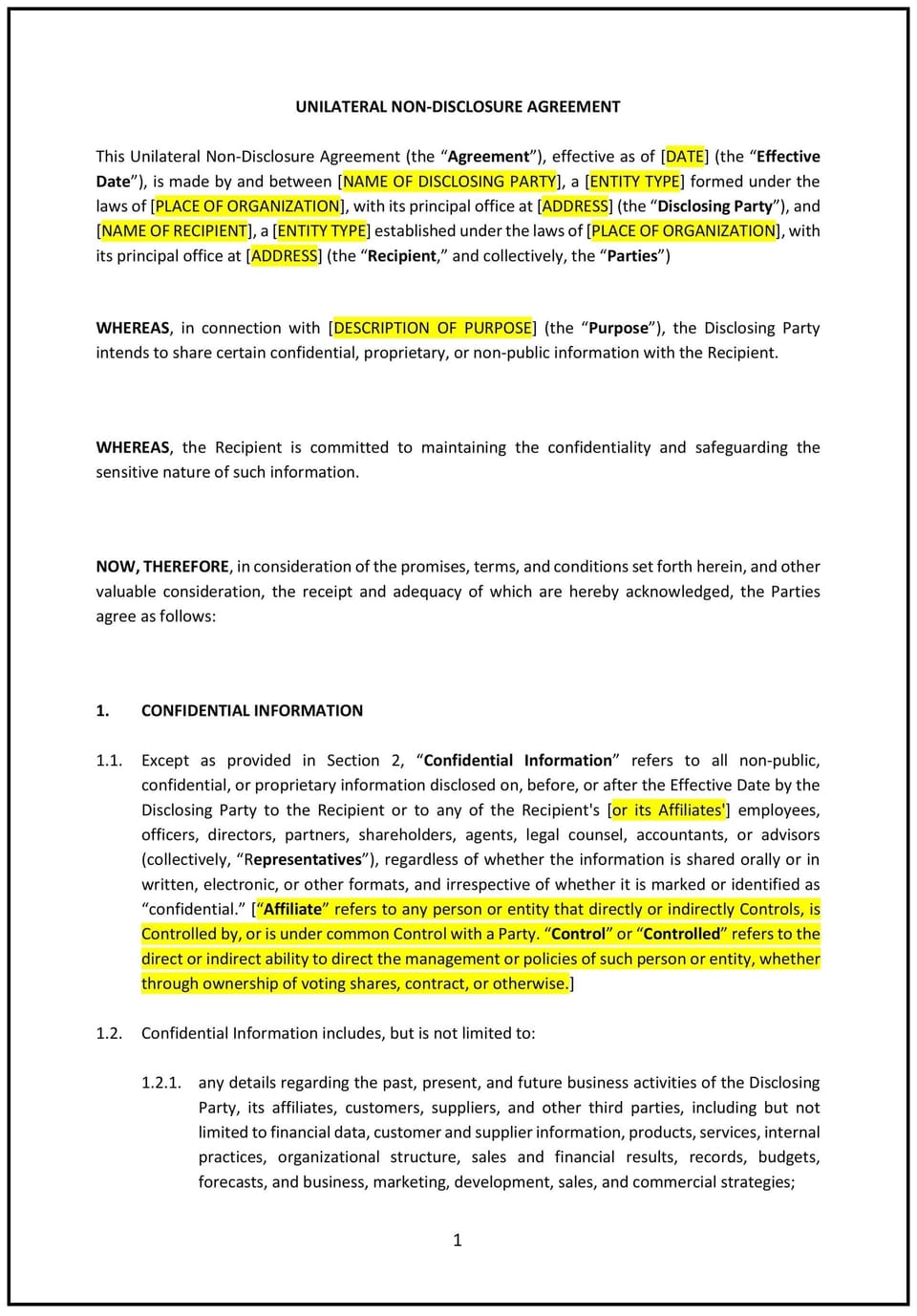Non-Disclosure Agreement (Unilateral) (Tennessee): Free template

Non-Disclosure Agreement (Unilateral) (Tennessee)
A Non-Disclosure Agreement (Unilateral) in Tennessee is a legally binding contract that ensures two parties protect shared confidential information. This agreement is widely used in business transactions, strategic partnerships, joint ventures, and collaborations where sensitive data such as trade secrets, financial records, client lists, and proprietary technologies are exchanged.
Tennessee businesses use Unilateral NDAs to establish clear confidentiality obligations for both parties, preventing unauthorized disclosures and misuses of critical business information. Tennessee contract law supports NDAs when they are reasonable in scope, duration, and restrictions. To ensure enforceability, businesses should structure their NDAs in compliance with the Tennessee Uniform Trade Secrets Act (TUTSA), which governs the protection of proprietary business information.
Industries such as healthcare, technology, manufacturing, and professional services in Tennessee frequently use NDAs to safeguard intellectual property and maintain a competitive edge. Businesses must ensure their agreements are specific, well-drafted, and applicable to Tennessee law to avoid potential legal challenges.
Tips for drafting and maintaining a Non-Disclosure Agreement (Unilateral) in Tennessee
- Clearly define confidential information to ensure both parties understand what is protected. This can include trade secrets, business strategies, client lists, and proprietary research.
- Establish a reasonable duration for confidentiality obligations. While most NDAs in Tennessee last between two to five years, trade secrets may require indefinite protection.
- Specify exceptions to confidentiality, such as information already publicly available or disclosures required by law or court order.
- Outline remedies for breaches, including injunctive relief, financial damages, and legal consequences in accordance with Tennessee contract law.
- Ensure compliance with the Tennessee Uniform Trade Secrets Act (TUTSA) to provide stronger legal protections against misappropriation of confidential information.
Frequently asked questions (FAQs)
Q: What should Tennessee businesses include in a Non-Disclosure Agreement (Unilateral)?
A: Businesses should define confidential information, outline exclusions, set clear confidentiality obligations, establish a reasonable duration, and specify legal remedies for breaches.
Q: How does a Non-Disclosure Agreement (Unilateral) benefit businesses in Tennessee?
A: It allows businesses to safely share sensitive information while protecting trade secrets and intellectual property from unauthorized disclosure or misuse.
Q: Are non-compete clauses enforceable in Tennessee NDAs?
A: Tennessee allows non-compete clauses, but they must be reasonable in duration, geographic scope, and business restrictions to be legally valid. Courts will not enforce overly restrictive agreements.
Q: How long should a Non-Disclosure Agreement (Unilateral) last in Tennessee?
A: The confidentiality period varies depending on the nature of the business and industry. While some NDAs last two to five years, trade secrets may require indefinite protection.
Q: How can Tennessee businesses enforce a Non-Disclosure Agreement (Unilateral)?
A: Businesses can seek injunctive relief or financial damages in Tennessee courts if a party breaches the agreement. NDAs structured under TUTSA offer additional legal protection for trade secrets.
Q: What happens if an NDA is too broad or restrictive in Tennessee?
A: Tennessee courts may refuse to enforce an NDA if it is too broad, restrictive, or unreasonable in its confidentiality obligations, duration, or scope. Businesses should tailor their NDAs to their specific industry and legal needs.
Q: Does Tennessee recognize verbal NDAs?
A: While verbal agreements may hold legal weight in some cases, written NDAs provide stronger legal protections and clearer enforceability in Tennessee courts.
This article contains general legal information and does not contain legal advice. Cobrief is not a law firm or a substitute for an attorney or law firm. The law is complex and changes often. For legal advice, please ask a lawyer.


